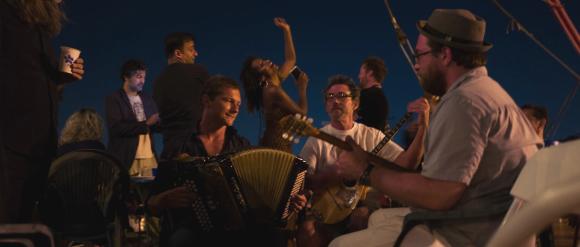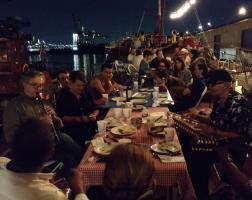 PortSide New York is a non-profit based in New York harbor on the historic tanker Mary A. Whalen. Their goal is to create a new kind of maritime destination in NYC, one that sets a new standard for how to bring urban waterways to life. Toward that goal, PortSide hosts TankerTime 2017, summertime get-togethers on the main deck of the Mary A. Whalen, with special events on the Second Sunday of each of the warmer months. Here is a fascinating and timely post by the president of PortSide, Carolina Salguero, about the latest Second Sunday.
PortSide New York is a non-profit based in New York harbor on the historic tanker Mary A. Whalen. Their goal is to create a new kind of maritime destination in NYC, one that sets a new standard for how to bring urban waterways to life. Toward that goal, PortSide hosts TankerTime 2017, summertime get-togethers on the main deck of the Mary A. Whalen, with special events on the Second Sunday of each of the warmer months. Here is a fascinating and timely post by the president of PortSide, Carolina Salguero, about the latest Second Sunday.
TankerTime: Do you have any Slovenians?
by Carolina Salguero, President, PortSide NewYork
In this era of Charlottesville, anti-immigrant politics and Muslim bans, I want to share how PortSide NewYork is celebrating different cultures and bringing different people together. One of our means is music and evening TankerTime on the MARY A. WHALEN. In doing so, we continue the multicultural traditions of Red Hook and port districts in general.
Summer 2017, PortSide added a Mediterranean music jam to Second Sundays TankerTime, “WaterStories of the Wine Dark Sea,” as we call it in a tribute to the ancient Greek poet Homer who called the waters of the Med “wine dark.”
The goal of adding the music was cultural exchange, using music as a magnet to bring people, making it participatory by making it a jam, which is a musical conversation, rather than a concert where audience and musician don’t mix.
It’s working.
We picked the Mediterranean because it is a sea, and PortSide programs are WaterStories, and because immigrants from around that particular sea represent some of the main immigrant groups in Red Hook history. Italians, Greeks, Syrians, Spaniards, and others.
Here are some anecdotes from the TankerTime of Sunday August 13.
Early in the evening, a tall man comes up to me looking a bit excited. “What’s going on here? I just came on the ferry… my daughter forget her jacket in Bay Ridge, and I saw this and came over to see what’s going on while she goes back to get her jacket.”
I explain TankerTime. Hearing that he has an accent, I ask “where are you from?”
“From Yugoslavia.”
“Some of your people are on the boat just ahead of ours, come with me.”
I walk him to Mladen’s boat DIPLOMAT. Mladen is a Bosnian who was in Sarajevo for three years during the Bosnian war. He was injured during the war and left as a refugee to Germany, then came to the USA, to the Midwest. Recently, he moved to NYC and is reviving a tired historic ship. Midst the renovation site, he has dinners for friends that convene the peoples of Yugoslavia, many who had to leave due to ethnic cleansing, “I am a Serb, my wife is a Catholic” is a typical explanation. As I brought my tall visitor aboard, and he heard his language, he was all smiles. “This is great,” he said, and I left him.
Two hours later Mladen’s party joined TankerTime, and the tall man, Predrag, came up to me and said. “Thank you. I am so glad my daughter forgot her jacket. Here she is… I am so glad I found this. It is hard to find my people, and they are all here. Except Slovenians. Do you have any Slovenians? “
The first musicians to play were from overseas. They were in New York for a Balkan music workshop in the Catskills. The American musicians who have been playing Mediterranean music during TankerTime were at the same event and brought them, along with musicians from Seattle and elsewhere. The overseas musicians were described to me as “the best in the world at what they do.” I don’t really know the stories of all the visiting musicians, but from what I’ve pieced together since, we had a Romani musician, a Greek singer and clarinetplayer and his wife and other American players in the Balkan tradition, which is itself a mash-up of many cultures.
 Our TankerTime guests included a journalist from Turkey, an Iranian professor, and the Frenchman Nicolas Anderson who is himself a powerful magnet for diverse people. Nicolas is learning a Greek instrument, the Oud, and presented the idea for our music jams by saying “Brooklyn has a lot of places to jam country and bluegrass but nothing for Mediterranean music.” That was the genesis of “WaterStories of the Wine Dark Sea,” to which PortSide will be adding movies and talks to explore WaterStories of the Mediterranean past and present.
Our TankerTime guests included a journalist from Turkey, an Iranian professor, and the Frenchman Nicolas Anderson who is himself a powerful magnet for diverse people. Nicolas is learning a Greek instrument, the Oud, and presented the idea for our music jams by saying “Brooklyn has a lot of places to jam country and bluegrass but nothing for Mediterranean music.” That was the genesis of “WaterStories of the Wine Dark Sea,” to which PortSide will be adding movies and talks to explore WaterStories of the Mediterranean past and present.
Other TankerTime guests included an Italian man who stumbled upon TankerTime and hurried off for food for his wife and infant, many people from the harbor community, and kayak ers and rowers from programs in Brooklyn and Manhattan, who discussed water policy issues and the incident last year when a ferry collided with several kayakers. Eve Mosher, a noted artist whose work has to do with water and water issues, wrote a proposal. Kids explored, locals chatted and ate dinner. I spent a long time talking to Abdu, from Mali, who lives in Carroll Gardens.
The diversity of ethnicities was striking, and this fits the history of Red Hook as described in PortSide’s e-museum Red Hook WaterStories feature “The Peoples of Red Hook.”
Traditionally, ports brought people as well as goods. Some people were transient but left a stamp; some stayed. In the words of Johnathan Thayer, one of our Red Hook WaterStories advisors, “‘Sailortowns’ describe urban waterfront districts that catered to the transient population of seafarers constantly coming and going in between voyages at sea. Populated with boarding houses, saloons, print shops, nautical equipment purveyors, and ministry outposts, sailortowns were urban spaces where local workers, immigrants, reformers, and itinerant sailors met, interacted, and influenced each other—and by extension the urban environment surrounding the district. Because of the temporary nature of shore leave, sailortowns saw constant turnover in population and fostered a sense of “otherness” relative to the rest of the city—a characteristic of portside areas and seafaring culture which continues to shape the urban landscape to this day.”
That is the history of sailortown Red Hook, otherness. PortSide celebrates that diversity. WaterStories bring us together in a shared space the way ports have historically. PortSide continues seafaring history.
If you are musician who plays music from any of the Mediterranean cultures, come join us! We treat musicians to free dinner and wine as compensation for their glorious music. For everyone else, it’s BYO food and drink. Hope to see you aboard!
PortSide NewYork’s TankerTime: Great Greek singing, 8/13/2017
The next Second Sundays TankerTime is September 10, 5pm to midnight. That is scheduled to be the last one of the year as October evenings can be too cold.
If you have an idea for a talk, book reading or movie screening relating to Mediterranean culture, issues and immigrants, please email us at chiclet@portsidenewyork.org.
If you want to support what we do, please donate!
Second Sundays TankerTime 2017 is sponsored by NYC Ferry and Dry Dock Wine + Spirits. Thank you!

Thanks for posting this on your great blog!